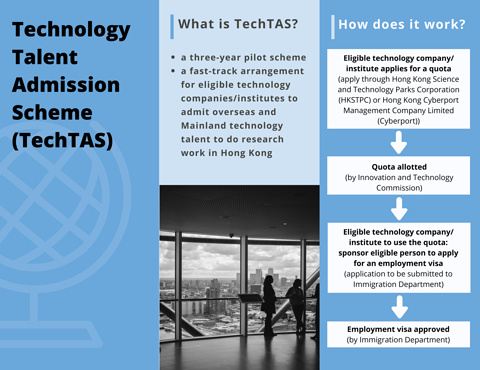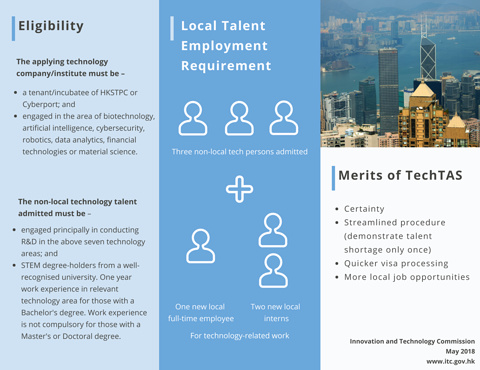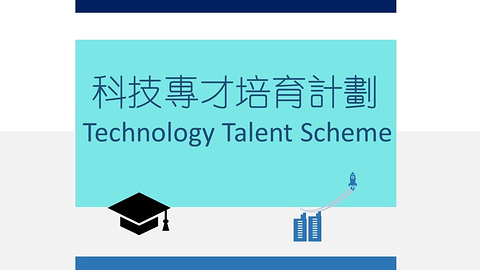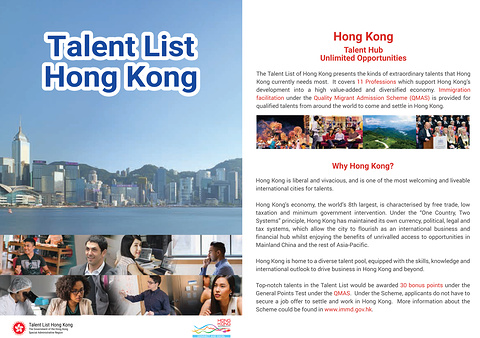Demographic figures for reflection
9 September 2018
Hong Kong’s population has increased by nearly 60% over four decades from 4.67 million in 1978 to over 7.44 million this year (provisional figure: 7 448 900). The figures alone show that there is no problem with our manpower supply. The reality, however, is quite the opposite. Our city is facing the dual challenges of rapid population ageing and labour force shrinking.
Firstly, the elderly population (people aged 65 or above) will almost double in 20 years. It is projected to soar from 1.27 million this year to 2.37 million in 2036, expanding its share in the total population (excluding foreign domestic helpers) from 17.9% to 31.1%.
Secondly, Hong Kong’s fertility has shown a general declining trend over the past 40-plus years. Fertility rate has hovered around low levels despite a rebound in recent years from the 2003 trough. The total fertility rate decreased from 3 459 live births per 1 000 women in 1971 to 1 125 in 2017, which means that on average for women of childbearing age (i.e. 15-49 years old), the rate is about one child per woman only. Latest projections foresee the total fertility rate staying low and standing at 1 166 in 2066.
Thirdly, the total labour force (excluding foreign domestic helpers) is projected to rise from 3.64 million in 2017 to a plateau of 3.67 million to 3.68 million during the period between 2019 and 2022, before declining to 3.51 million in 2031 and further to 3.13 million in 2066. The overall labour force participation rate (i.e. the proportion of the labour force in the population aged 15 and above) is projected to decrease from 59.1% in 2017 to 49.6% in 2066.
The figures point to continuously low fertility and dwindling workforce. Insufficient labour force will slow down economic growth. On the other hand, population ageing is pushing up the expenditure on healthcare and elderly welfare and services. Slackening growth coupled with increased spending will affect the sustainability of our public finances. Therefore, we cannot afford to overlook the major challenges brought by the demographic changes.
Our future hinges on today’s population policy. Hong Kong needs to enhance the productivity of its working population by tapping into the potential labour force as far as possible and opening up new sources of manpower.
To enrich our human capital, improving and reinforcing the local manpower development is the core strategy. Through equipping home-grown talent with the skills needed for the future economy, we can promote upward mobility and hence drive forward economic progress. The policy measures include reviewing the school curricula, encouraging the post-secondary education sector to offer more programmes responding to the manpower needs of individual industries, and promoting vocational professional education and training as well as continuing education.
 |
 |
 |
At the same time, we are actively recruiting global talent to further augment our human capital without compromising the interest of local workers. For example, we have put in place various admission schemes to draw in talented persons from overseas and the Mainland who possess the skills, knowledge or experience required by but not readily available in Hong Kong. We also encourage non-local graduates to stay after study, and the second generation of Chinese Hong Kong residents who have emigrated overseas to return to the city. On my duty visit to London, UK in two weeks’ time, I will meet with some students and professionals from Hong Kong and take the opportunity to encourage them to come back.
Talent is a key factor in the global innovation and technology race. The Government has been rolling out various initiatives to proactively attract and nurture top-notch talent, and build up a critical talent pool necessary for driving the innovation and technology industry.
A five-year pilot Technology Talent Scheme was launched last month by the Innovation and Technology Commission. A sum of $500 million under the Innovation and Technology Fund (ITF) is set aside for the scheme to nurture and bring together more technology talent through the Postdoctoral Hub Programme and the Reindustrialisation and Technology Training Programme (RTTP).
Under the Postdoctoral Hub Programme, recipients of the ITF as well as incubatees and tenants engaging in innovation and technology of the Hong Kong Science and Technology Parks Corporation and the Hong Kong Cyberport Management Company Limited may receive funding support for recruiting up to two postdoctoral researchers to conduct research and development work. The ITF will provide a monthly allowance of $32,000 for each postdoctoral researcher for up to 24 months. The postdoctoral recruits must possess a doctoral degree in a STEM-related (science, technology, engineering and mathematics) discipline from either a local university or a well-recognised non-local institution. Response to the programme is overwhelming, with about 80 applications received in just two weeks or so since its launch.
The RTTP, which is administered by the Vocational Training Council, provides subsidies on a 2:1 matching basis for local companies to train their staff in advanced technologies, especially those related to Industry 4.0. The trainees must be Hong Kong permanent residents employed by a non-government or non-subvented local enterprise. The funding ceiling for each company is $500,000 per financial year.
 |
Furthermore, the Government promulgated the first Talent List of Hong Kong last month (on 28 August), covering 11 professions that will best support Hong Kong’s development as a high value-added and diversified economy. Quality people from around the world are welcome to make Hong Kong their home through the Quality Migrant Admission Scheme, which currently has an annual quota of 1 000.
The Talent List was drawn up after extensive consultation with stakeholders and the industries. It will help enhance our competitive edge in attracting international talent and spur the development of local talent, thereby boosting economic growth and employment.
Manpower is crucial to the success of Hong Kong. Sufficient and quality manpower is the pivotal force behind sustained social and economic progress. In this regard, the Government is determined to create an inclusive and cohesive society with high upward mobility, especially for the younger generation, through formulating appropriate manpower policies that allow people to give full play to their potential.

